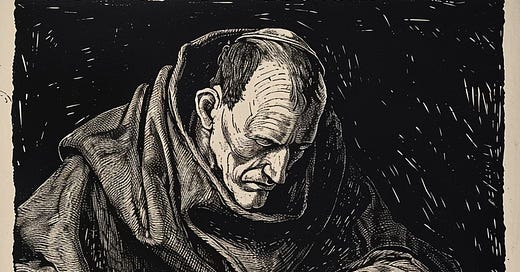Claude de La Colombière: The Cure for Pride
The evil is great, but it is not irremediable; it may even be a most valuable remedy
In a letter from 1678, St. Claude de La Colombière1 speaks directly to my heart, addressing the despair I often feel over my own failures and fumblings. I like him because he helps me see beyond my guilt, pointing out how the devil tries to use my failings to hold me in despair. God, on the other hand, uses my failings to lead me nearer my eternal home: humility. See yourself as a living testament to God’s mercy, I hear St. Claude tell me, learn to receive mercy—and in learning to receive—you will eventually learn to give mercy, just like God.
1678
I was touched with sorrow in reading your letter, not so much for the faults you have committed as for the sad state into which they have thrown you because of the little confidence you have in God's goodness and in the loving ease with which, you ought to know, he receives back those who have offended him most grievously.
I can see the wiles and malice of the devil, who is trying to profit by your faults to throw you into despair, while, on the other hand, the Spirit of God would lead you to humility and compunction and inspire you to make reparation for what you have done.
The evil is great, but it is not irremediable; it may even be a most valuable remedy to cure you entirely of all pride and presumption.
If I were in your place, this is how I would console myself. I would say to God with great confidence:
“Lord, here is a soul who exists only to show forth your mercy in the presence of heaven and earth. Others glorify you in showing the strength of your grace by their fidelity and constancy, they show how liberal you are to those who are faithful. As for me, I will glorify you in showing how good you are toward sinners, that your mercy is above all malice, and that nothing can exhaust it; that no fall, however shameful and guilty it be, should make the sinner despair of pardon. I have grievously offended you, O my loving Lord, but it would be worse if I insulted you by despairing of my pardon. In vain your enemy and mine sets new snares for me: I will lose everything rather than the hope I have in your mercy. If I had fallen a hundred times, and my sins were a hundred times worse than they are, I would still hope in you.”
After this it seems to me that nothing I could do in reparation for my sin and the scandal I had given would cost me too much. Then I would begin to serve God with more fervor than before and with as much peace as though I had never offended him.2
St. Claude de la Colombiere (1641-1682) was a prominent Jesuit priest and an eminent figure in Christian spirituality, renowned for his role as a spiritual director. His spiritual guidance was deeply rooted in a profound understanding of God's mercy and love, qualities that defined his approach to helping others navigate their faith journeys. St. Claude is perhaps best known for his association with St. Margaret Mary Alacoque, to whom he provided spiritual direction and support, particularly in the promotion and understanding of the devotion to the Sacred Heart of Jesus. Through his spiritual direction, he guided many to recognize their own worthiness of God's love, despite their imperfections. Canonized a saint in 1992, his legacy continues to inspire those seeking to deepen their relationship with God, making him a lasting figure in the realm of spiritual guidance and direction. He is quoted as saying, “God loves us as much as if there were only one of us in the world.”
de la Colombière, Claude., de la Colombière, Claude. The Spiritual Direction of St. Claude de la Colombiere. United States: Ignatius Press, 2018.





Thank you Jon! I needed this today. It’s Particularly poignant regarding the grievous and deeply rooted sin of jealousy, which seems to rear its ugly head discouragingly often! A word of compassion and grace. Thank you!